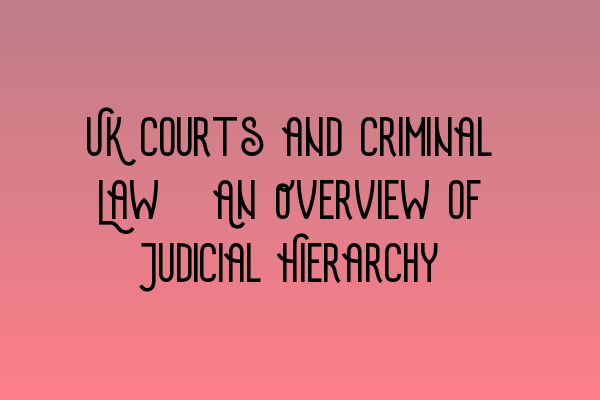UK Courts and Criminal Law: An Overview of Judicial Hierarchy
Welcome to SQE Criminal Law & Practice Law UK! In this blog post, we will provide you with an extensive overview of the judicial hierarchy in the UK courts and its relevance to criminal law cases. Understanding the structure and functions of the different levels of courts is crucial for any legal professional or aspiring lawyer.
The Supreme Court
At the apex of the UK court system is the Supreme Court. It is the highest court in the country and has the final jurisdiction in all matters. The justices of the Supreme Court are appointed based on their legal expertise and experience. They handle significant criminal law cases that raise important legal issues and have a substantial impact on the development of the law. To learn more about the role of the Supreme Court, check out our SQE 2 Preparation Courses.
The Court of Appeal
Beneath the Supreme Court lies the Court of Appeal. This court hears appeals from lower courts, including criminal cases. It is divided into two divisions: the Criminal Division and the Civil Division. The Criminal Division focuses exclusively on criminal law matters. The Court of Appeal is responsible for reviewing the decisions made by the lower courts and ensuring fair and just outcomes. To understand more about the Court of Appeal and its role in criminal law appeals, consider our SRA SQE Exam Dates article.
The High Court
The High Court is the next level in the judicial hierarchy. It handles both criminal and civil cases of significant importance. The High Court is divided into three divisions: the Queen’s Bench Division, the Family Division, and the Chancery Division. Criminal law matters are typically dealt with in the Queen’s Bench Division. If you’re interested in preparing for the SQE 1 exam, we recommend exploring our SQE 1 Preparation Courses.
The Crown Court
Below the High Court is the Crown Court, which is exclusively dedicated to criminal law cases. This court handles serious criminal offences, such as murder, rape, and drug trafficking. The Crown Court also plays a significant role in sentencing and conducting jury trials. To get a deeper understanding of criminal law practice, take a look at our SQE 1 Practice Exam Questions and SQE 1 Practice Mocks FLK1 FLK2 articles.
The Magistrates’ Court
Finally, we have the Magistrates’ Court, which is the lowest level of court in the UK judicial hierarchy. This court primarily deals with minor criminal offences, such as petty theft, public disorder, and traffic violations. Magistrates, who are trained legal professionals but not typically legally qualified judges, preside over these cases. The Magistrates’ Court plays a crucial role in dispensing justice swiftly and efficiently.
In conclusion, the UK courts’ judicial hierarchy is a well-structured and crucial system that ensures justice in criminal law cases. From the Supreme Court to the Magistrates’ Court, each level plays a specific role in the legal process. If you are interested in pursuing a career in criminal law practice, it is vital to have a comprehensive understanding of how these courts function. For more information and resources related to criminal law and the SQE exams, visit our website at SQE Criminal Law & Practice Law UK.
